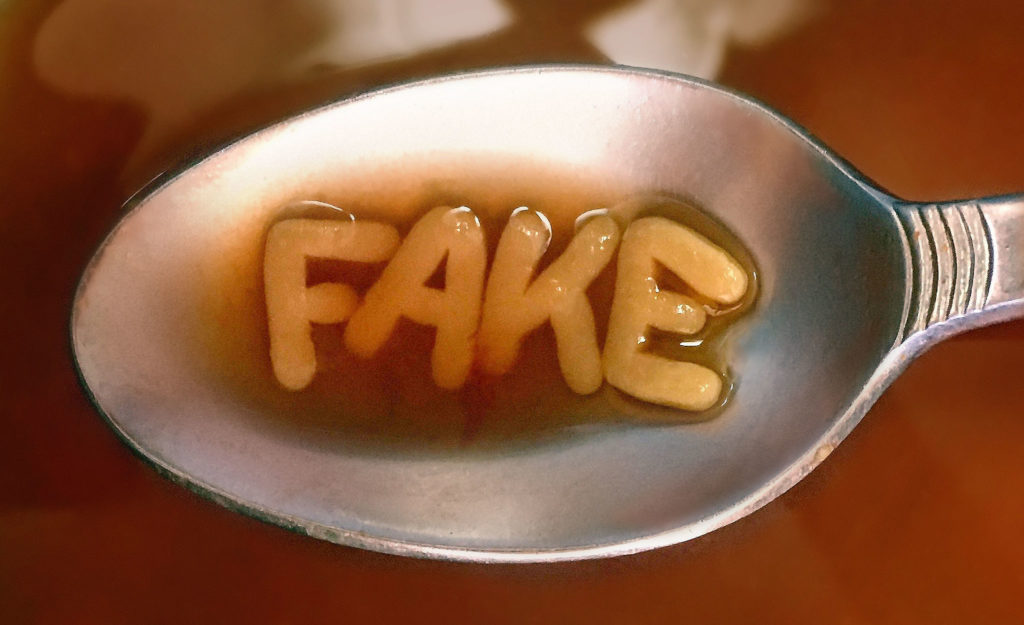The European Commission today released a proposal on combating fake news. It includes a call for the extra copyright for news sites or “link tax”, which is part of the copyright reform plans currently hotly debated in Parliament and Council. In parallel, rapporteur Axel Voss is also trying to add this justification for the law in Parliament.
Unfortunately, that’s in itself fake news. The link tax won’t help fight fake news – it will make the problem worse.
 A transparent attempt to “soup up” the link tax – cc-0 Alan Levine
A transparent attempt to “soup up” the link tax – cc-0 Alan LevineThe two main reasons are:
- Putting a price tag on spreading articles from legitimate press publications (or at the bare minimum, adding legal uncertainty) is guaranteed to end up decreasing the circulation of professional news. The visibility of other sources will in turn be boosted, including fake news and propaganda.
- The link tax will disadvantage small, new and independent publishers who rely on being listed in aggregators and having their content shared on social media. As a result, innovation in the sector and media pluralism will be harmed, which will impede the diverse and vibrant news ecosystem we need to effectively counter fake news.
Academic consensus against
In an open letter released on Wednesday, 169 scholars (including professors of journalism studies) say the plan will “play into the hands of producers of fake news” because it will “restrict further the circulation of quality news”, and thus “not guarantee the availability of reliable information so much as the dominance of fake news”.
Previous studies found that the link tax “may well set back the function of the press as public watchdog” and ”will not foster quality journalism”.
Journalists oppose it
The Organized Crime and Corruption Reporting Project calls the link tax “a giant step backward in the fight against misinformation”, because it “would severely limit the ability of OCCRP and other independent media organizations to provide accurate and fair reporting”.
A coalition of innovative publishers representing hundreds of news outlets – who the Commission claims would benefit from the link tax – are likewise fighting against the plan, warning that it will “stifle media pluralism” and have “serious negative effects on the quality of the press”.
After years of experience with the similar German law, the journalists’ association DJV concluded: “Best abolish it”.
Competent conservatives disagree
Dorothee Bär, Germany’s new Digital Minister and a member of the staunchly conservative CSU, said that she rejects the extra copyright for news sites because it “hasn’t stood the test” and “doesn’t work”.
The CDU’s internet policy spokesperson in the German Bundestag – a fellow party member of both Günther Oettinger (who originally proposed the law) and Axel Voss (who is pushing to make it even worse) – likewise recognises the link tax as “extremely dangerous” and “a bad proposal”, correctly warning that it may lead platforms to remove real news and thus elevate dubious sources.
Jumping on the buzzword bandwagon
The Commission’s own high level expert group on fake news and disinformation did not recommend the neighbouring right. This supports the suspicion that it was included not for factual reasons, but in an attempt to jump on a buzzword bandwagon to shore up support for the Commission’s struggling proposal.
When the neighbouring right proposal was originally presented, combating fake news was not given as a motive. Adding it as a retroactive justification, unsupported by a proper impact assessment, is mission creep that’s in conflict with the much-touted principles of “better regulation”.
What to do instead
If the Commission is serious about fighting fake news, it needs to correct its course on the neighbouring right immediately.
- The “presumption rule”, an alternative proposal supported by the Greens/EFA group as well as former Parliament rapporteur Therese Comodini and multiple member states in the Council, would help publishers enforce existing copyrights without sabotaging the circulation of legitimate news.
- The Greens/EFA group today launched a report on alternative models of financing investigative journalism, which suggests a number of policy solutions.
- Regulating ad targeting, as I argued in Parliament last week, may be the best option: Ending the profiling arms race, in which internet giants gather ever more data on us in order to ever more precisely target ads, would not just protect our privacy and eliminate one way of delivering fake news to those most susceptible to it, but also return a share of the advertising market to content businesses like the news.
To the extent possible under law, the creator has waived all copyright and related or neighboring rights to this work.